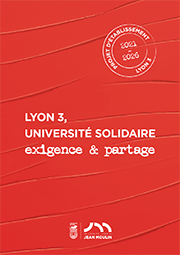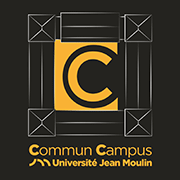AccueilRechercheLes productions scientifiquesThèsesThèses soutenuesThèses soutenues - 2006-2020Thèses soutenues - 2014
-
Partager cette page
- Recherche,
MICKALA Cyrile
Habiter : sciences, phénoménologie et herméneutique à partir de Gaston Bachelard et Maurice Merleau-Ponty.
Thèse en Philosophie - Etude des systèmes soutenue le 13 juin 2014.
Is it still possible to inhabitate and live the laid out and constructed space in particular, as for considering the techno and industrial flood that determines and influences the field of modern architecture? Rationalism and functionalism of a given trend of modern architecture by incorporating techno and industrial progress in the world of home, seems to condemn the experience of living in an irreversible crisis. The architectural activity wanting to meet scientific and techno-industrial progress, it requires practical experience in home and prescientific places of life, of living standards arising from the only reason. It is a general an architecture and a modern, abstract and functionalist urbanism that develop along the path of rational objectivity initiated by Galileo and Descartes, they control , manage and aestheticize the whole world and all human experience to space by stripping poetic , mythological and emotional considerations. Thus, the construction of human institutions housing becomes in identifying the crisis of living a «prosaic and technological process deriving directly from the mathematical reason, a functional diagram, or a rule of formal suits «in drawback of the concrete experience of living. But if the architecture does not matter to itself, if it is not a practice that is an end in itself because it opens to another, how can we still philosophically hope to authentically, originally and poetically live the world and the space of the house in particular? Philosophy, by phenomenological and hermeneutic approach inheritated from Gaston Bachelard and Merleau-Ponty presents to the modern experience of living, original significant ways that respond to the crisis it faces. Renewing differently more than the only purely rational knowledge the relations of man to the space, it presents itself as a remarkable way of re- understanding, rereading and re-enchantment of the original experience of inhabitating the world , the city and the space of the house.
Mots-Clés : architecture, urbanisme, rationalisme, fonctionnalisme, science, techno-industrie, phénoménologie, herméneutique, habiter, espace et expériences poétiques.
Keywords : architecture, urbanism, rationalism, functionalism, science, techno-industrial, phenomenology, hermeneutics, living space and poetic experience.
Directeur de thèse : Jean-Jacques WUNENBURGER
Membres du jury :
Chris YOUNES, Professeur, Ecole Nationale Supérieure d’architecture Paris-la Vilette
Maryvonne PERROT, Professeur, Université de Bourgogne, Dijon
Jean-Philippe PIERRON, Professeur, Université Jean Moulin Lyon3
Jean-Jacques WUNENBURGER, Professeur émérite, Université Jean Moulin Lyon 3
Président du jury : Maryvonne PERROT
Mention : Très honorable
Equipe d'accueil : IRPHIL



